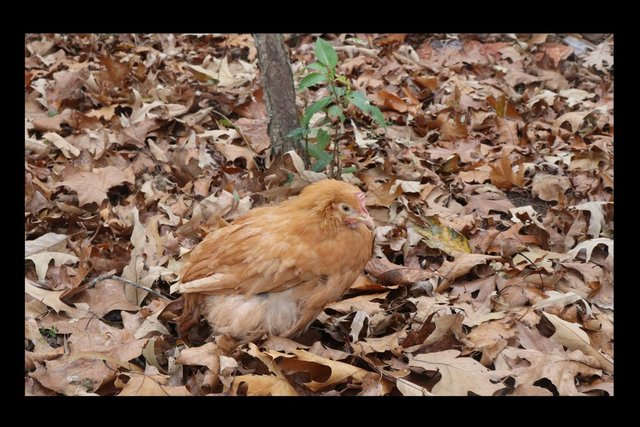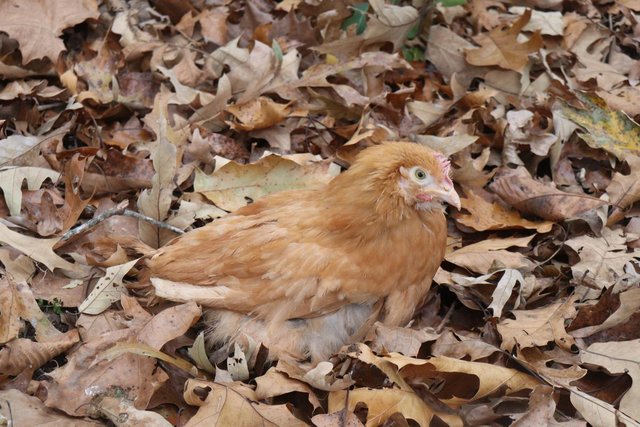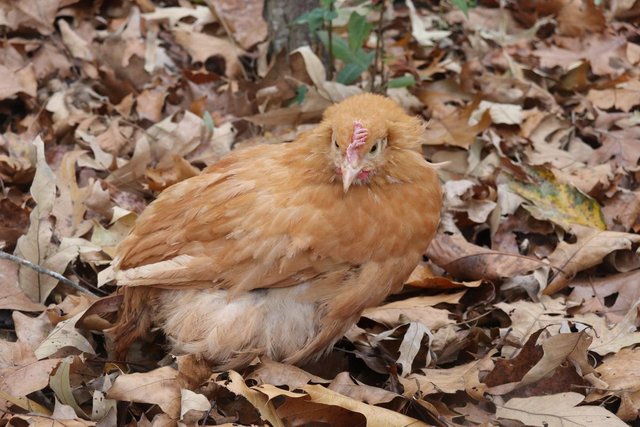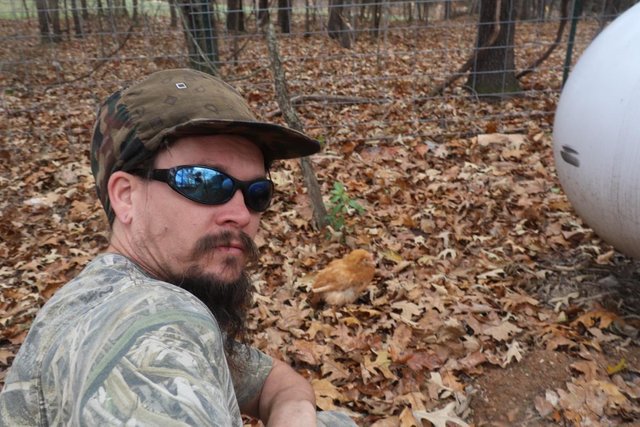CHICKEN CAMOUFLAGE - THOUGHTS TO CONSIDER WHEN FREE RANGING CHICKENS

It's good to contemplate things ahead of time, and possibly prevent the untimely death of your poultry.
There are a lot of things to consider when thinking about raising chickens. Do you want them for eggs? Do you want them for meat? Do you want them for both? Would you like them to hatch out their own young?
Whatever the purpose of your flock, if you are considering free ranging them, you might want to think about the color of your birds.

EASY TO HIDE, HARDER TO KILL

Unless you plan to keep your flock cooped up all day, there is a good chance that they'll be spending part of their life "exposed." Whether it is actual free-ranging or just being kept in a pen with an open top, your poultry may be easy prey for various predators. While some creatures like foxes and raccoons hunt at ground level (and often after dark), other predators would fit into the "death from above" category.

Both hawks by day and owls by night can be lethal to your flock. The most likely color to be easy prey is white in my opinion. Except for when the ground is covered in deep snow, when your poultry is less likely to be outside anyway, the white color sticks out against the greens of spring and summer and the browns of fall. The last birds that we picked up were these Orpingtons, which certainly blend in with their environment this time of year. We'll still have to keep an eye on them, but they should be harder for soaring raptors to locate.
Anyway, in case you've never considered things like this, I figured I mention it and potentially save you some heartache. Does anyone else have any views on this subject? If so, please let us know in the comment section below. Thanks!

As always, I'm @papa-pepper and here's the proof:

proof-of-camouflage-chicken

Until next time…
Bitcoin (BTC) - 35jP794XJ1yHUaoxuQUXwGPyCuy6zyiQA5


TO TRANSLATE POSTS VIA OPERATION TRANSLATION CLICK HERE

interesante amigo @papa-pepper buen post, saludos a la @family-pepper...
Lol so cute!
I've also heard that Rhode Island Reds are hawk resistant because they look like Hawks when fully grown. Supposedly some big birds, though I've not had any.
I'd like to range our birds one day. The first three we got were essentially wild, and I'm afraid they'd run off. The other six are our tame girls, and they range very well.
We are slowly breaking ours in. I think the guineas will get some more freedom here in the near future, the main chicken flock next spring. Right now, we've just got our young Orpingtons on the loose during the day, along with one ewe sheep.
How do you like guineas?
Posted using Partiko Android
We like them a lot. Haven't eaten any yet, but we ain't too picky. We've got so many ticks and seed ticks on our land, they'll come in super handy next year.
I've heard they're awesome for that. They'll be fat and happy!!
Posted using Partiko Android
Great on ticks, VERY noisy....
The RIR are the same size as any heritage bird. And a hawk doesn't have to carry the bird off. It will try to eat it in place. That's been our experience. Basically, no chicken is hawk resistant. :))
I would have never thought about that. Now, you've got me rethinking my future flock. lol
Let me know when you're ready, perhaps we'll have some to share. Plan on hatching out quite a few next spring and summer.
Sweet! I may do that. Are you planning on raising some meat birds?
Moar chigginses!
Posted using Partiko Android
Without the predators that you have, the nearest is a hawk, about the size of a starved hen, that stays away from people, we had the opposite problem.
We had white hens so you could see that they were all in the chook house at night.
Interesting. That makes sense. I figured some various people from around the world would have other ideas about how things work there. Thanks!
Being Dairy farmers, we would have had problems getting green hens anyway,
LOL - Spray paint?
That's something that I honestly haven't thought about too much. Makes sense to me though. Do you have a covered area where the chickens sleep at night to be safe from owls and such?
We have closed coops for night, and open yards for the day.
You are so right. All the white chickens (white rock) usually are the first to be sacrificed to the free range raiders. For us, Barred Rocks usually lasted the longest. We have the problem of bald eagles around here. They seem to kill chickens for fun. And nothing one can do about their depredations except keep the chickens in a cage. I have confronted many a bob cat looking for a chicken snack.
Wow, I've yet to meet a bobcat, but I've heard they are around here too.
You got chickens, mister B. Cat will eventually come calling. A bob cat isn't so scary (although they can mess you up, they are not likely to unless you get too close to the kittens and usually will move along.. but a local woman did end up with a 150 stitches when one landed on her out of a tree). Its the mountain lions on the loose way away from the mountains that I don't care for. We had a mountain lion kill a deer a 100 ft from my front door. And this is Nebraska. Its why I most times don't go cut firewood without the Glock 20.
If you have house cats that start disappearing you might have a bob cat around. The house cats aren't afraid of its smell, don't run away and the bob cats think Fluffy is tasty.
Yep. White or solid light-colored birds usually have short lifespans. I can’t even begin to count the numbers Grandma lost in her time of raising chickens, in comparison to other colors. One year we (my hubby and I) had an eagle take up residence on the rimrocks above our house and it dutifully picked off all our light colored chickens and our light-colored barn cats. 😕 Awful, but true. Reds, barred rocks, spangled hamburgs, Auricaunas, etc are much more resilient. Even the solid black austrolorpes fare better than white.
Thanks for chiming in with that!
My experience here in our high predator area (both land and aerial) is light colored birds go first. Predator magnets. Because our area has so many predators, ours don't truly free range, but have large pens 50' x 50' with overhead protection that we move every week over the pastures.
We have had several Barred Rocks that were persistent escapees. One lived to 9.5 yrs and died of injuries from another hen. We had one this summer who was out every day and she made it until the week before Freezer Camp in October, when the fox got her.
So my experience is that if I want a flock that will feed me, I have to protect it, and free ranging is out. We invest too much in the birds to have them picked off. This is our food and eggs for a year. Once they are gone, they are gone. No more til next year.
Also, once a predator gets a bird, they will keep returning until there are no more. So it's best to not get them started. When the fox got Stupid Bird in October, it started prowling the perimeter of the pasture pen. We were 1 week from Freezer Camp and it could have been a disaster. But we took immediate measures and beefed up the security and the fox went elsewhere.
We had a juvenile Cooper's hawk get through the overhead protection for the layer pen and kill a bird. It kept hanging around and we could not fix the overhead to keep it out. So we were forced to lock the hens in for 3 days until it moved on.
I've yet to hear of a free ranging situation that ended well for the birds. If you can sustain losses, and don't mind feeding predators, then I guess it's an option.
Freezer camp! Interesting way to put that.
I guess when it snows the brown ones are in trouble :-)